In a small town on the rural Isle of Wight, a T-shirt company run by two brothers in their 30s is breaking new
ground in manufacturing innovation. As a T-shirt maker, Teemill’s
business sounds unremarkable, but its use of software engineering to deliver its products sustainably and on a
customised basis offers a potential model for other companies.
Based in Freshwater, Teemill illustrates how software engineering can provide a competitive advantage for
manufacturers across a range of sectors. While for big companies the idea is nothing new – the German industrial
giant Siemens has often boasted that it employs more software specialists than Microsoft – among small to mid-sized
businesses the concept is far less established.
Behind the “front end” of Teemill’s production is a cloud-based software platform called TeemillNode that links the
firm to customers and suppliers.
The software allows individuals who have purchased the company’s T-shirts to return them at the end of their life
for recycling, making the manufacturing process less environmentally damaging and moving closer to a “circular
economy”. The T-shirts themselves can be made in thousands of variations chosen by customers. The TeemillNode
software is also licensed to other businesses, which use it to drive their operations as well.
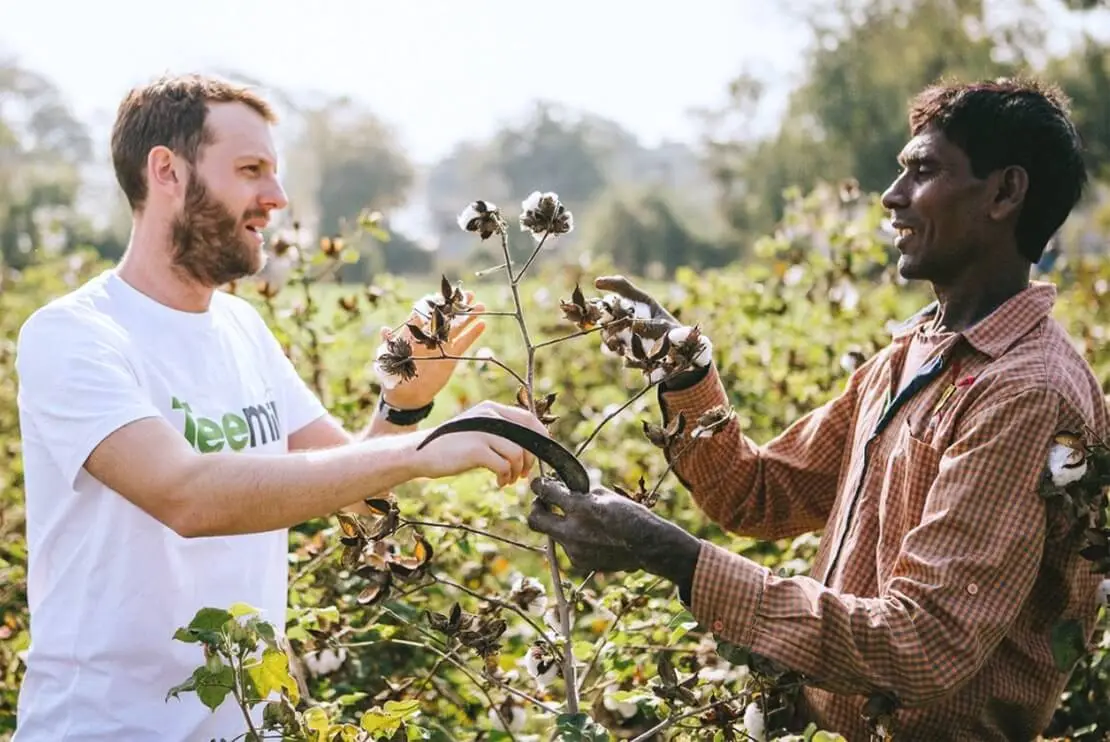 Farms in India provide "sustainably grown" cotton for the company's T-shirts: pictured here is Rob Drake-Knight on a visit
Farms in India provide "sustainably grown" cotton for the company's T-shirts: pictured here is Rob Drake-Knight on a visit
“We started the business thinking it would be good to run a company that both made useful products and improved on
the sustainability of clothing in general and T-shirts in particular,” says Mart Drake-Knight, who started Teemill
in 2008 with his brother Rob soon after the two had graduated – Mart in engineering and Rob in business studies. The
brothers launched Teemill with an initial investment of £200 near their childhood home on the Isle of Wight, known
mainly as a holiday destination.
The clothing industry is well known for producing huge amounts of waste: many clothes in the developed world are
discarded after being warn only a few times. Some 60 per cent of a typical T-shirt is plastic fibre.
Mart explains that while T-shirts are normally regarded as simple products, their design and manufacturing becomes
complex when sustainability and customisation are added to the list of requirements. The challenge led Teemill, he
says, to organise “what amounts to two businesses, one making the products and the other involved with
transportation and materials handling”.
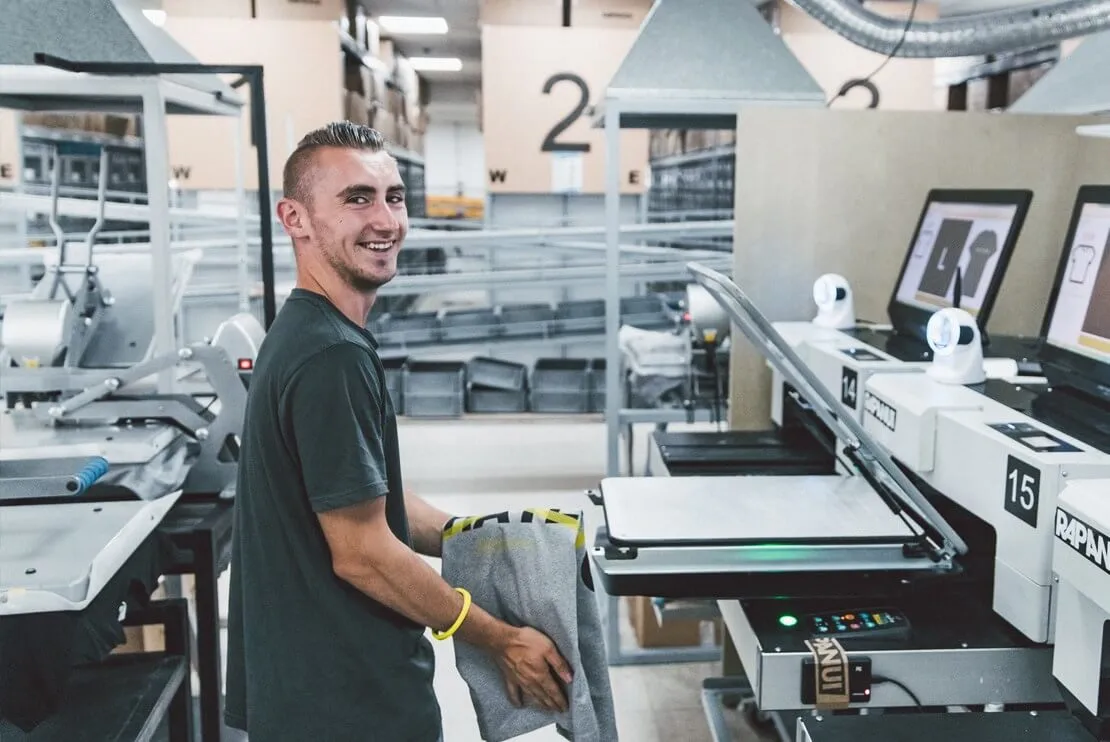 Richard Wren - among Teemill's 130 employees - at work in the company's print operations on the Isle of Wight
Richard Wren - among Teemill's 130 employees - at work in the company's print operations on the Isle of Wight
Digitisation – in the shape of TeemillNode, which the brothers developed inhouse – was the answer. “We thought we
could construct a digital platform as a base for both elements of the operation,” says Mart who at 36 is a year
younger than his brother. “We are tackling the problem through a combination of clever software and hardware."
TeemillNode’s importance is comparable to the central role of bespoke digital architecture at much bigger commercial
groups such as the US internet behemoth Amazon. The company’s approach illustrates how fresh thinking can lead to
vibrant enterprises that create jobs, which Made Here Now aims to support by highlighting examples of UK
manufacturing innovation likely to offer rewarding jobs for young people.
The company has 130 employees, most aged under 30. It does not disclose sales but says that in recent years it has
been “doubling in size” each year. It says it makes and sells “several thousand” T-shirts a day and has branched out
to make other clothing lines including hoodies as well as unrelated products such as jigsaw puzzles, sometimes
through partnerships with printers.
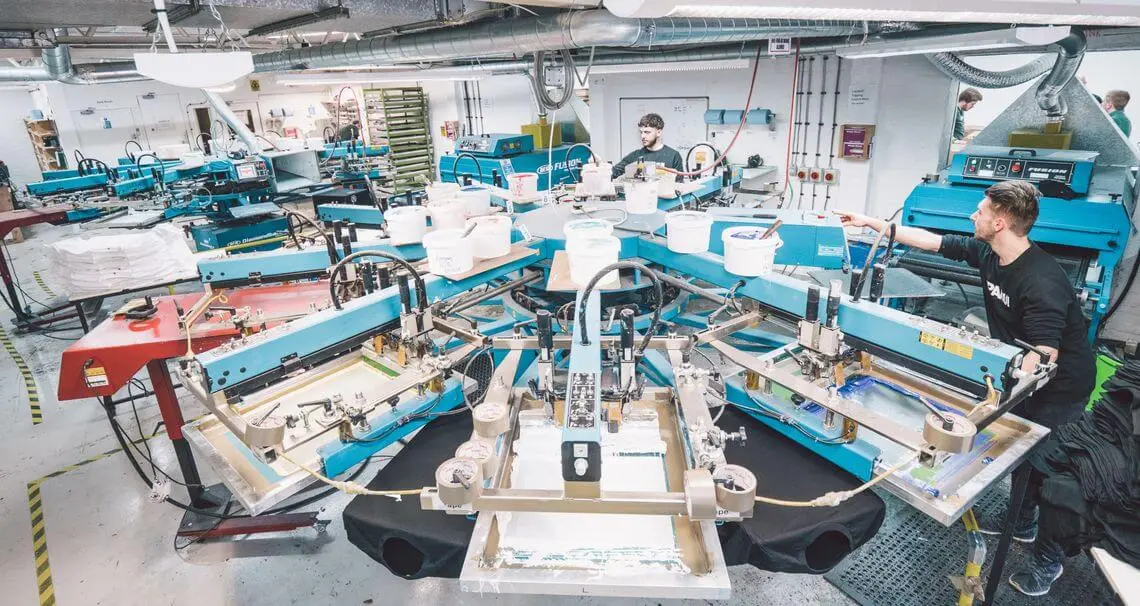 A mix of "clever software and hardware" is at the heart of the manufacturing processes
A mix of "clever software and hardware" is at the heart of the manufacturing processes
The Drake-Knights are “amazing guys”, says Karen Quickenden, a director of Meridian 3, a printing company that works with Teemill. “From the time they started they
haven't stopped trying to think of new ways to improve their business,” she says. “Rather than buying something such
as software off the shelf, they want to develop their own solutions and invariably end with a result that is better
than what is available." Meridian 3 is also based on the Isle of Wight, off the south coast of England.
The brothers have earned plaudits from Matthew Bond, a director of Kustom Clothing, a Hertfordshire-based T-shirt maker and a competitor. “They [Teemill] have
introduced new thinking about digital platforms [into the garment sector],” Bond says. “While a lot of the industry
is old school, they have a fresh approach.”
Teemill has a following at the Ellen MacArthur
Foundation, a global body that promotes the circular economy, based on designing and making products using
less resource-intensive materials and recapturing waste. Teemill demonstrates “how businesses in the fashion
industry can be economically viable and work in the long term… through applying circular design principles from
beginning to end”, according to the foundation.
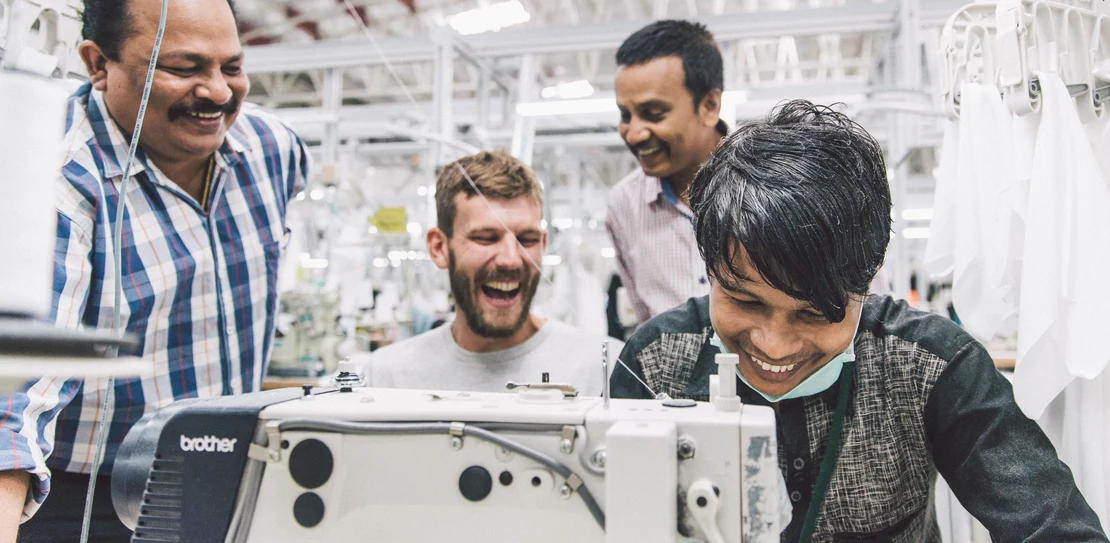 A factory in India - where Mart Drake-Knight is trying out his skills as a machinist - is among the plants making blank T-shirts that Teemill later turns into finished products using digital printers based mainly in the UK
A factory in India - where Mart Drake-Knight is trying out his skills as a machinist - is among the plants making blank T-shirts that Teemill later turns into finished products using digital printers based mainly in the UK
One of TeemillNode’s main jobs is enabling Teemill’s 10,000 clients around the world, a mix of individuals and
businesses, to develop and upload designs that are sent to digital printers to be printed on blank T-shirts made by
Teemill’s contractors in low-cost countries including India.
TeemillNode is also used to market new product ideas to customers, and for organising interactive sessions to help
them improve their creative offerings. The software is used as the basis for the websites used by many of Teemill’s
customers to act as their own “shop window”.
One of Teemill’s clients is Paul Harfleet, a London-based artist who runs Birds Can Fly, which uses illustration and design to inspire bird lovers. Among its products
are T-shirts, made using Teemill’s manufacturing operations and based on Harfleet’s designs.
 Paul Harfleet of Birds Can Fly is a Teemill customer - and a fan of the company's environmental credentials
Paul Harfleet of Birds Can Fly is a Teemill customer - and a fan of the company's environmental credentials
Harfleet says he was drawn to Teemill by its sustainability principles. Explaining the function of the software
platform, he says: “You create the design and upload it. There is an excellent digital back-end and content
management system. The printing happens after this, with volumes decided based on likely demand.” He speaks highly
of the company’s support, both through the software and in person over the phone. “They [the company] go above and
beyond to help,” he says.
Data and designs are transferred through TeeMillNode to printing machines at Teemill’s headquarters and print sites
elsewhere in the UK and in the Czech Republic. The software keeps track of sales and marketing interactions with
customers, plus the logistical complexities of shipping blank T-shirts to the print sites – blanks come in 200
colour and style variants from garment factories around the world. At any time, Teemill is likely to have some
100,000 blank T- shirts in stock at its UK and Czech facilities ready for printing in the variety of styles selected
or designed by individual customers, in batches that can start with one and run to thousands.
The blanks are made from sustainably grown cotton, using minimal pesticide and reduced water content, and maximise
the use of recycled fibre.
 Among the company's 10,000 customers is the RSPB wildlife charity which uses T-shirts both as a source of revenue and to send messages
Among the company's 10,000 customers is the RSPB wildlife charity which uses T-shirts both as a source of revenue and to send messages
The recycling process uses a code attached to each T-shirt that encourages the buyer to send them back too Teemill
instead of throwing them away. The customer then gets a discount of up to £5 on their next order. Unwanted products
are returned to the Isle of Wight where the material in them is sorted for separation, re-spinning and processing in
the plants run by Teemill’s suppliers. The company does not disclose details of how the process works or how many
T-shirts are returned.
Looking ahead, the brothers – who are the main shareholders in the company, along with chairman Will Hobhouse – are
vague about plans. But they say they want to bring in more experienced management and “scale up and
internationalise”.
Mart says the environmental processes on which Teemill is based should give it a solid platform for expansion. “Our
corporate customers are more interested in circularity. Making circularity part of the way a business operates seems
a no brainer.”
Digitisation delivers business boost for customers
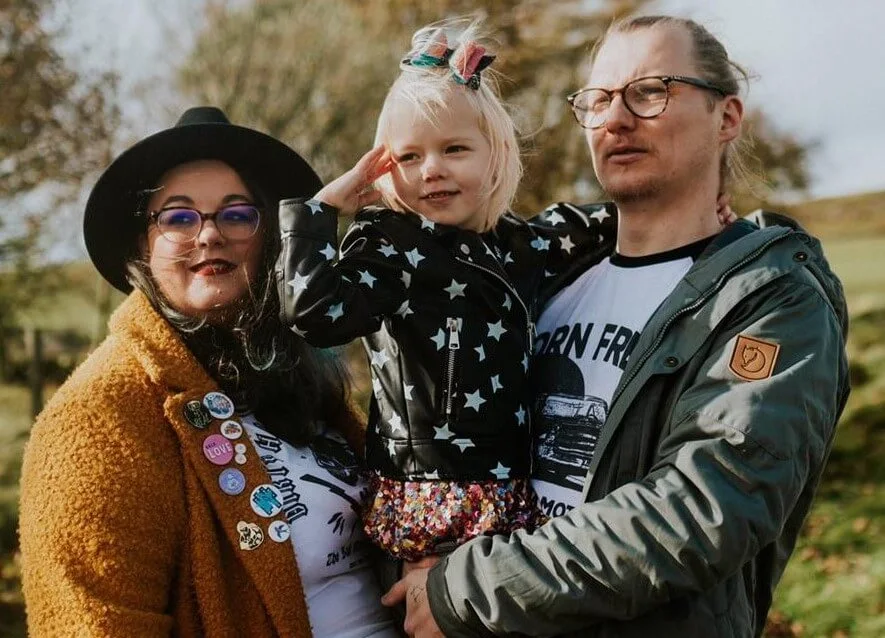 Damian Jaworski and his wife Martyna run Moss Peak, a small T-shirt maker and a Teemill client. Photograph: Al of State of Love & Trust
Damian Jaworski and his wife Martyna run Moss Peak, a small T-shirt maker and a Teemill client. Photograph: Al of State of Love & Trust
Teemill’s manufacturing capabilities and software-based design tools have become a vital form of assistance to many
small firms and other organisations, among them Moss Peak, which makes T-shirts and is run by Damian Jaworski with his wife Martyna. Jaworski
describes his Derbyshire business as an outgrowth from a “hobby” of design and photography.
Searching for ways to make his work available to others and possibly generate some income, he saw a way to make this
happen through Teemill. He says he started using Teemill’s software system – TeemillNode – as little more than a
beginner. “Uploading graphics is easy. You do everything online [using the] ‘create a new product’ tool. You click
upload, pick your design place it wherever you want on the T-shirt visualisation, save it and it’s done.”
TeemillNode powers the Moss Peak website and e-commerce store, all run on Teemill’s servers. “Pretty much everything
you need to use to run your store is online,” Jaworski says.
He likes the recycling options too. “Most clothing has a big percentage of plastic ingredients, which makes them
basically impossible to recycle and they will stay in landfills forever. Teemill reuses old cotton to make a new
product, which means zero waste.”
He sums up his experience: “Nobody else combines quality, sustainability and affordability in the same way as they
do.”
Another much better-known client of Teemill is the RSPB birds and wildlife charity. The RSPB’s T-shirts – made in the same way as Moss Peak’s –
complement its other fund-raising and promotional activities, advertising the charity’s messages while also
providing income.
Describing Teemill as a “fantastic platform and partner”, the RSPB says: “Teemill’s design ideas and streamlined
business model has [allowed] us to reach a new demographic, as its approach is attractive to a younger and ethically
focused consumer who we want to appeal to.”
The Glacier Trust, a charity working to alleviate climate change, is another small organisation that uses
Teemill’s services to assist in selling and promotion. Morgan Phillips, co-director, says: “Teemill is a great
option for us. They give us an opportunity to do something we wouldn’t otherwise be able to do - sell T-Shirts. The
T-shirts are high quality, and we love the ecological and social justice principles [behind Teemill]. The software
is easy to use, it’s been a lot of fun coming up with designs.”
Teemill’s other customers include the cosmetics maker Lush;
environmental pressure group Greenpeace; BBC Earth, a specialist arm of the broadcasting group; designers and
celebrities including Katharine Hamnett and Joe Wicks; plus bigger well-known clothing brands that like to remain
anonymous. About a fifth of the company's sales comes from large corporate customers, Teemill says, with about 40
per cent of its clients based outside the UK.
